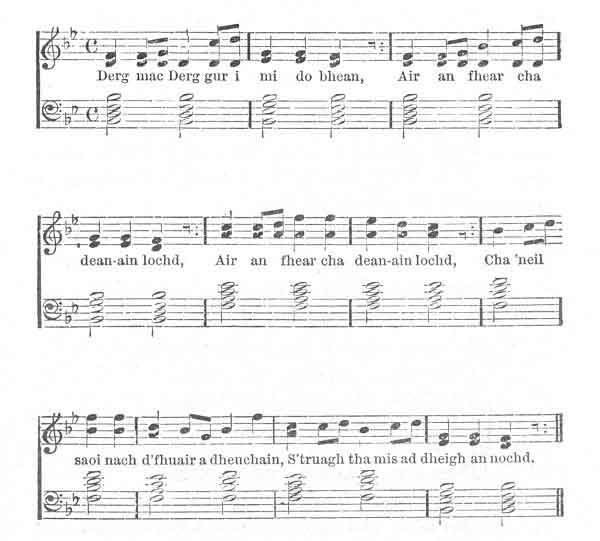
I HAVE already referred to a note by Mrs. MacTavish on this subject, vol. ii. 489. She tells how she learned Dan an Dearg (the Song of the Red) more than sixty years ago, from a ploughman who used to chant it at his work; and she adds--
"The subject of the song is Diarmaid O Duine, or Dearg as he was sometimes called. Diarmid was, as I daresay you know, the progenitor of the clan Campbell, who are called at times Siol Diarmid, at other times Clann Duine. I never heard who his wife was, but she was esteemed a virtuous and worthy person; yet she had enemies, who wished to persuade her husband that she did not love him, and who concerted a plot to prove her fidelity. Diarmid was a great sportsman, as all Fingalians were, and hunted wild boars, which, it would appear, were numerous in the Scottish forests at that period. The sport at times proved fatal to those engaged in it. Pretended friends persuaded Diarmid to pretend that he was killed by one of those animals. They put him on a bier, and carried him home to his wife, all bloody, as if he had really suffered as they said. She conducted herself with becoming fortitude and composure, ordered refreshments
for those assembled to watch the remains of their chief, sat down along with them, and commenced singing the song which follows. It is very touching in the original. Never having been favoured by the muses, I cannot do it the justice which it deserves, or that I could wish. The translation is as literal as I can make it." 1
1
Derg, son of Derg, I am thy wife,
The husband whom I would not hurt, p. 62
The husband whom 1 would not hurt,
There never was a worthy who was not tried;
Wretched am I after thee this night.
2
Derg, son of Olla of the enlightened mind,
By whom so softly the harp was played,
By whom so softly the harp was played,
Beloved was the hero who kept no wrath,
Though Derg was laid low by a hog.
3
I see the hawk, I see the hound,
With which my loved one used to hunt,
With which my loved one used to hunt,
And she that loved the three
Let her be laid in the grave with Derg.
4
Then let us rejoice this night,
As we sit around the corpse of a king,
As we sit around the corpse of a king
Let us be hospitable and liberal,
Thanks be to God for every thing.
1
Derg mac Derg gur i mi do bhean;
Air an fhear cha deanain lochd.
Cha n' eil saoi nach d' fhuair a dheuchain
S' truagh tha mise ad dheigh an nochd.
2
Derg mac Olla chridhe 'n iuil,
Leis an seinte gu ciuin cruit;
B 'ionmhuin an Laoch air nach do luidhe fearg;
Ged do thorchradh Derg le muic.
3
Chi mi n' t seabhag a's an cu
Leis an deanamh mo run sealg;
S' an neach leis ail ionmhuin an triuir
Cuirer i 's an uir le Derg.
4
Bi mid gu subhach an nochd
Sin nar suidhe mu chorp Righ
Bi mid gu furanach fialaidh;
Buidheachas do Dhia gach ni.
Diarmaid, who was never conquered in battle, was destroyed by stratagem. Some one of his enemies took a bet with him that he could not measure the length of a boar that he had killed by pacing its back against the bristles with his bare soles, which gave rise to the saying--
Tomhas n' tuirc n' aghaidh n' fhrioghain,
Measuring the boar against the bristles,
when any unlikely thing is proposed. He gained his bet, but it cost him his life; the boar's bristles being so strong that he bled to death. This legend is said to be the origin of the boar's head being the crest of the principal families of the Campbells.
MARY. MACTAVISH, November 1859.
The clan MacTavish are a branch of the Campbells, and this lady, in relating a legend of her own family, tells it as I have heard it repeatedly told, with variations, by peasants and fishermen, who firmly believed in their own descent from Diarmaid O'Duibhn, and in the truth of this legend.
The LAY OF DIARMAID is quoted p. 117, and mentioned
in several places in the Report of the Highland Society on the poems of Ossian, 1805. The version given below, though it resembles those which I have seen in books in some respects, differ from them all so as to make it evident that it is taken from none. I have no doubt that it is purely traditional.
I am inclined to believe that there was a real Diarmaid, in whose honour poems have been composed by many bards, and sung by generations of Scotch Highlanders, and that to him the adventures of some mythical Celtic Diarmaid have been attributed, in the same way that the mythical story of the apple has been ascribed to William Tell.
Be that as it may, the Lay of Diarmaid can be traced for a period of 300 years, and its story is known amongst the whole Celtic population from the south of Ireland to the north of Scotland.
61:1 The Gaelic and music were subsequently got from the same lady.